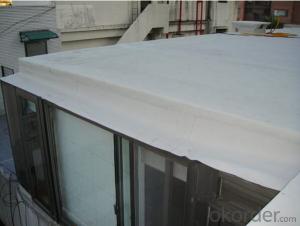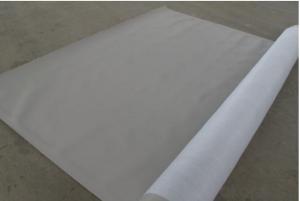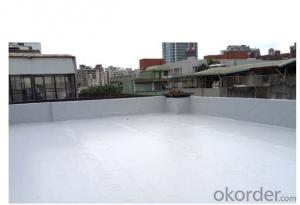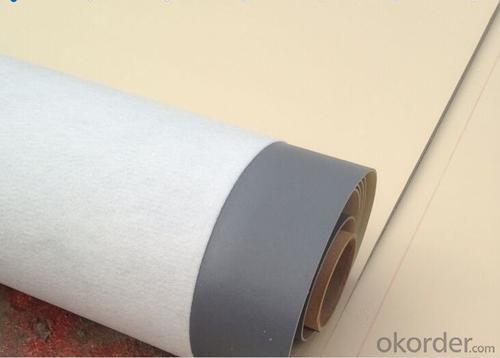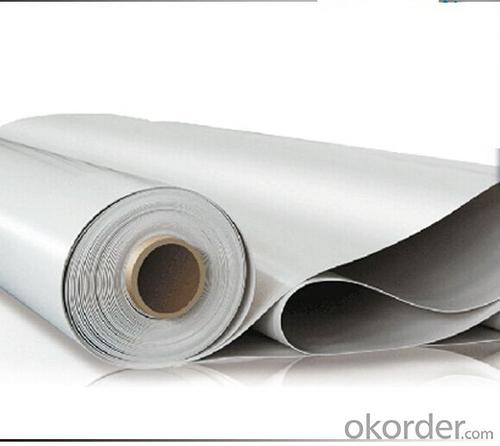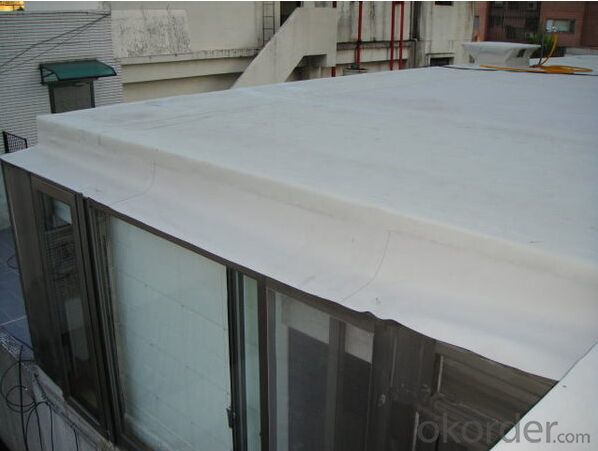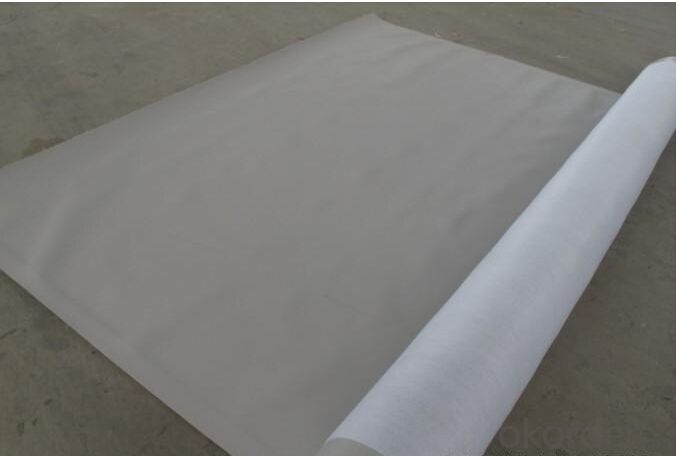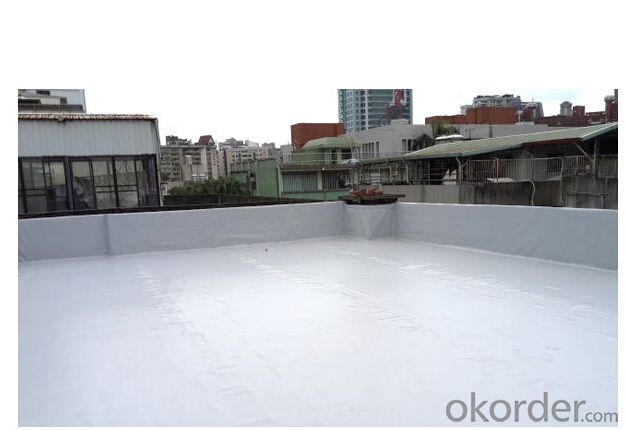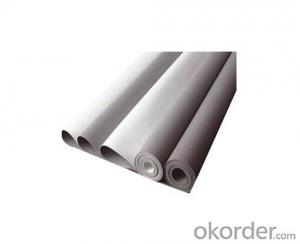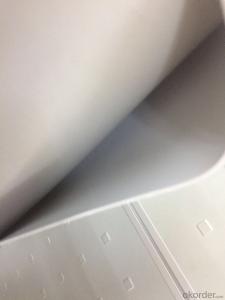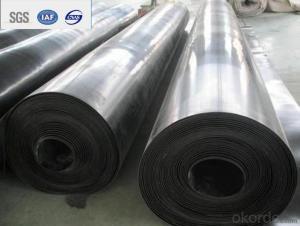PVC Roofing Waterproof Membrane with 1.2mm/1.5mm/2.0mm
- Loading Port:
- Qingdao
- Payment Terms:
- TT or LC
- Min Order Qty:
- 2000 m²
- Supply Capability:
- 300000 m²/month
OKorder Service Pledge
OKorder Financial Service
You Might Also Like
Introduction of PVC Waterproof Membrane
Polyvinyl chloride the pvc waterproofing plastic membrane is a kind of excellent performance of polymer waterproof material,PVC resin as the main raw material,add all kinds of special additive and anti-aging composition,the use of advanced equipment and advanced technology extrusion rolling is made.
The product has the tensile strength and elongation high shrinkage of small,low temperature soft good,long life and other advantages, the products wide 1.2m to 3.0m, the thickness of 0.8-2.0 mm(special specifications can be customized),stable performance,reliable quality,construction is convenient.
Features of PVC Waterproof Membrane
1)Excellent aging resistance. Service life of roofing material is over 20 years; service life of underground material is over 50 years.
2)Root resistant penetration, specially used on planting roofings.
3)Welding installation. Joints are solid and environment friendly, no pollution.
4)High tensile strength, good elongation and dimensional stability.
5)Good plasticity, easy and suitable for details installation.
6)Fireproof. Fire extinguished out of the ignition resource.
7)Surface is smooth, no fading and dirty resistant.
8)Width is over 2m. Construction wastage is small, more economical.
Classification and Specification of PVC Waterproof Membrane
N: Homogeneous PVC membrane
L: PVC membrane with fabric backing
W: Reinforced PVC membrane
Thickness: 1.2mm/1.5mm/1.8mm/2.0mm
Width:2050mm
Length:20m( Special specifications can be customized)
Size: 2.05mx20m
Color: white/grey, or any other colors.
Technical Data of PVC Waterproof Membrane
No. | Item | Index | |||||
1 | Thickness of resin layer of the middle fabric ,mm≥ | - | - | 0.40 | 0.40 | 0.40 | |
2 | Tensile performance | Max tensile strength,N/cm ≥ | - | 120 | 250 | - | 120 |
Tensile strength,NPa ≥ | 10.0 | - | - | 10.0 | - | ||
Max elongation% ≥ | - | - | 15 | - | - | ||
Breaking elongation % ≥ | 200 | 150 | - | 200 | 100 | ||
3 | Heat treatment size change rate%≤ | 2.0 | 1.0 | 0.5 | 0.1 | 0.1 | |
4 | Cold bonding | -25°c No cracks | |||||
5 | Watertightness | 0.3mPa,2h waterproof | |||||
6 | hot air aging | Tensile strength retention,%≥ | 80 | ||||
Elongation at failure rate,%≥ | 70 | ||||||
100% elongation appearance | no cracking | ||||||
7 | alkali resistance[10%Ca(OH)2normal temperature×168h] | Tensile strength retention,%≥ | 80 | ||||
Elongation at failure rate,%≥ | 80 | ||||||
8 | Elongation 40%500pphm | -------- | |||||
9 | ozone aging | elongation | |||||
40%500pphm | |||||||
elongation | flawless | ||||||
20%500pphm | |||||||
elongation | |||||||
20%100pphm | |||||||
10 | Artificial syndrome | Tensile strength retention, %≥ | 80 | ||||
Elongation at failure rate, %≥ | 70 | ||||||
100% elongation appearance | flawless | ||||||
11 | Bonding performance | processless | Since the baseline drift and stripping length in the following 5 mm, Harmless and harmful migration and different points | ||||
heat treatment | |||||||
alkali treatment | |||||||
Application of PVC Waterproof Membrane
PVC membrane applies special formula and its service life is much longer than other general waterproof membranes. Its excellent performance makes it be widely used in every field.
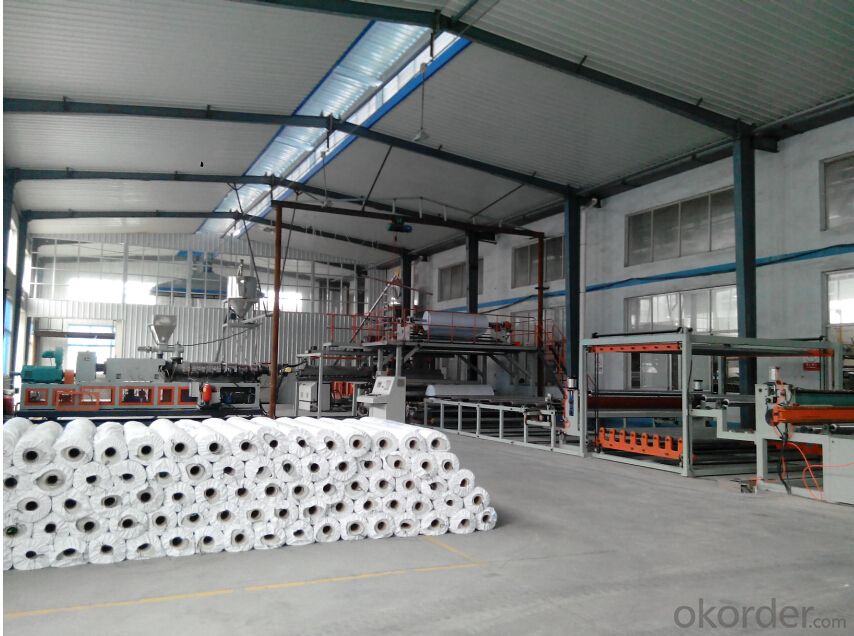
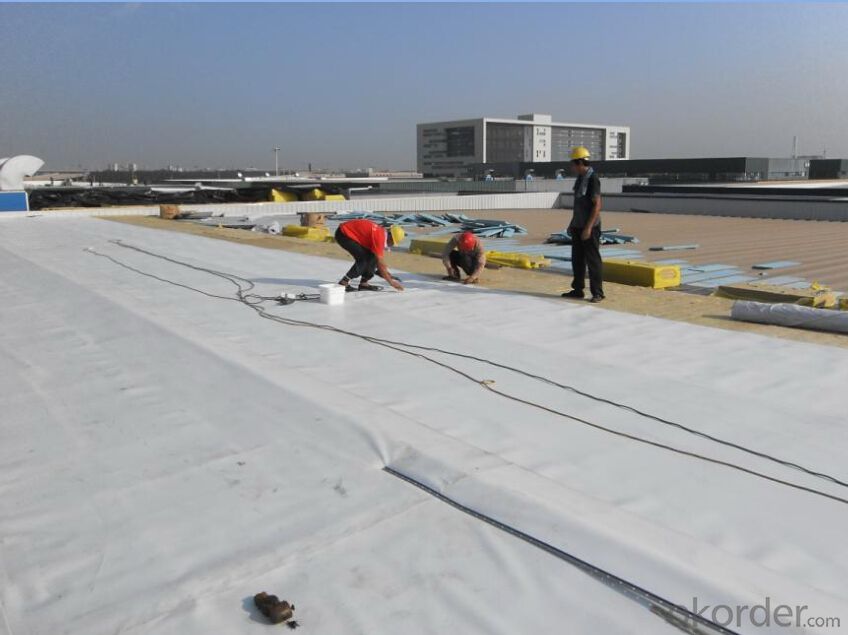
FAQ:
Can you produce 4m width?
Yes, no problem for us. We have four bases in China, largest one in this field.
How many quantity in one 20'' container for 1.2mm and 1.5mm?
480rolls, 11520m2 for 1.2mm and 400rolls, 9600m2 for 1.5mm
Can you provide free samples?
Yes, our samples are free, but express fees usually on buyer's account.
- Q: Can a waterproofing membrane be used for a balcony deck coating?
- Indeed, a balcony deck coating can utilize a waterproofing membrane. These membranes are engineered to establish a safeguarding barrier that hinders water infiltration, rendering them a superb alternative for balcony decks. Through the application of a waterproofing membrane onto the deck surface, one can avert water-related harm, including leaks, fractures, and deterioration, all of which may necessitate expensive repairs. Moreover, waterproofing membranes also shield the underlying structure of the balcony against moisture destruction, prolonging its durability. It is of utmost importance to select a top-notch waterproofing membrane that is specifically formulated for outdoor usage and can endure exposure to severe weather conditions.
- Q: Are waterproofing membranes suitable for exterior use?
- Yes, waterproofing membranes are suitable for exterior use. These membranes are specifically designed to provide a barrier against water penetration and are commonly used in various exterior applications such as rooftops, balconies, and foundations. They are made from durable materials that can withstand exposure to harsh weather conditions, UV rays, and temperature fluctuations. Waterproofing membranes help to prevent water damage, moisture buildup, and potential structural issues caused by water infiltration. Additionally, they can be applied to different types of surfaces including concrete, metal, and wood, making them versatile for various outdoor environments. Overall, waterproofing membranes are a reliable solution for protecting exterior surfaces from water damage and prolonging their lifespan.
- Q: Can a waterproofing membrane be used for a planter roof?
- Yes, a waterproofing membrane can be used for a planter roof. A waterproofing membrane is designed to prevent water from penetrating through a surface, making it an ideal choice for protecting the roof of a planter. It can effectively prevent water damage to the underlying structure, including potential leaks and deterioration caused by moisture. Additionally, a waterproofing membrane can also help to retain moisture within the planter, ensuring that plants receive adequate hydration.
- Q: Are there any specific building code requirements for using a waterproofing membrane?
- Different jurisdictions have specific building code requirements when it comes to using a waterproofing membrane. These requirements often include certain standards that the membrane must meet, as well as instructions for its installation provided by the manufacturer. The building codes may specify the type of membrane to be used, its minimum thickness, and the method by which it should be installed. For instance, the International Building Code (IBC) mandates that waterproofing membranes must be listed and labeled by an approved testing agency. The code also demands that the membrane be installed in a way that offers continuous protection and can withstand expected structural movements and environmental conditions. Apart from the type and installation requirements, building codes may also outline the procedures for testing and inspecting waterproofing membranes. This is done to guarantee that the membrane is correctly installed and will effectively prevent moisture intrusion, thus safeguarding the building against potential damage and deterioration. To ensure compliance with these requirements and to have a waterproofing membrane that meets the necessary standards, it is crucial to consult the local building code or seek assistance from a qualified professional.
- Q: Can a waterproofing membrane be used for wastewater facilities?
- Yes, a waterproofing membrane can be used for wastewater facilities. Waterproofing membranes are specifically designed to protect structures from water damage, including from wastewater. These membranes are typically made of durable materials such as PVC, EPDM, or TPO, which have excellent resistance to water and chemicals. Wastewater facilities require robust protection against the corrosive and potentially damaging effects of wastewater. Installing a waterproofing membrane can help prevent water infiltration, which can lead to structural damage, deterioration, and contamination of surrounding areas. Waterproofing membranes provide a barrier that prevents water and moisture from penetrating the facility's walls, floors, and foundations. This helps to maintain the integrity of the structure, prevent leaks, and protect against corrosion caused by chemicals present in wastewater. In addition to protecting against water and chemical damage, some waterproofing membranes also offer resistance to UV rays, high temperatures, and freeze-thaw cycles, which are important considerations for wastewater facilities located in extreme weather conditions. Overall, using a waterproofing membrane in wastewater facilities is a reliable and effective solution to ensure long-term protection against water damage, maintain the structural integrity, and enhance the durability of the facility.
- Q: SBS Shale Waterproof Coil
- Advantages: toughness, easy to crack. Adapt to the changing structure of the roof. Disadvantages: shorter service life.
- Q: Can a waterproofing membrane be used on balconies and decks?
- Balconies and decks can benefit greatly from the use of a waterproofing membrane. It is highly recommended to install this protective layer to safeguard against water damage. These outdoor areas are exposed to rain, snow, and other weather conditions, which can lead to issues like rot, mold, and structural deterioration if water seeps into the structure. By applying a waterproofing membrane beneath the surface material, such as tiles or decking, a barrier is created that prevents water from penetrating and redirects it away from the structure. This not only prolongs the life of the balcony or deck but also preserves its visual appeal. Moreover, the use of a waterproofing membrane is particularly crucial for balconies located above living spaces, as it prevents water from dripping down. In conclusion, incorporating a waterproofing membrane is an effective solution to ensure the durability and functionality of balconies and decks.
- Q: Modified asphalt waterproofing membrane SBS I G PE4 What does it mean?
- Waterproof membrane refers to the asphalt or polymer waterproof material impregnated in the carcass, made of waterproof material products, in the form of coil, known as waterproofing membrane.
- Q: Can a waterproofing membrane reduce noise transmission?
- Indeed, noise transmission can be diminished by employing a waterproofing membrane. These membranes, usually composed of sound-insulating materials like rubber or synthetic polymers, when applied to various surfaces, establish a barrier that absorbs or obstructs sound waves. Consequently, the amount of noise able to permeate the structure is reduced. Moreover, these membranes serve the purpose of sealing gaps and cracks in walls or floors, thereby decreasing noise leakage. Hence, while their primary function is to prevent water infiltration, waterproofing membranes also offer the secondary advantage of lowering noise transmission.
- Q: How does a waterproofing membrane handle expansion and contraction of the substrate?
- A waterproofing membrane is designed to handle expansion and contraction of the substrate by being flexible and elastic. When the substrate expands or contracts due to temperature changes or other factors, the waterproofing membrane can stretch or shrink accordingly without undergoing any damage or failure. The membrane's flexibility allows it to adjust to the movements of the underlying substrate, ensuring that it remains intact and fully functional. This flexibility is achieved through the use of materials that have high elongation properties, such as modified bitumen, rubberized asphalt, or synthetic polymers like PVC or TPO. In addition to being flexible, a waterproofing membrane also has a high tensile strength, which enables it to resist tearing or breaking under the stress caused by expansion and contraction. This strength is crucial in preventing any water infiltration or moisture damage to the substrate. Furthermore, the installation of a waterproofing membrane often involves overlapping or interlocking the membrane sheets. These overlapping seams provide additional protection against any potential movement of the substrate. If the substrate expands or contracts, the overlapping seams allow the membrane to accommodate the movement while maintaining a continuous and watertight barrier. Overall, a waterproofing membrane is specifically designed to handle the expansion and contraction of the substrate. Its flexibility, high tensile strength, and overlapping seams ensure that it remains durable, reliable, and effective in preventing water penetration even as the substrate moves.
Send your message to us
PVC Roofing Waterproof Membrane with 1.2mm/1.5mm/2.0mm
- Loading Port:
- Qingdao
- Payment Terms:
- TT or LC
- Min Order Qty:
- 2000 m²
- Supply Capability:
- 300000 m²/month
OKorder Service Pledge
OKorder Financial Service
Similar products
Hot products
Hot Searches
Related keywords


